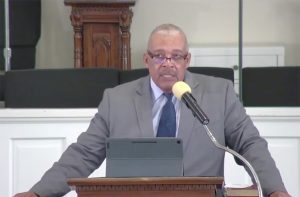A Reexamination of Climate Change Issues
The GISS ”Y2K” Programming Glitch
December 6, 2009
Climate change researcher Steve McIntyre of the website ClimateAudit.com had discovered an error in computer software which is commonly used for tabulating temperate records, now known as the “GISS Y2K Error.” While the issue was not actually due to a “Y2K” Glitch, the programming error started commencing in January of 2000 when it made temperatures appear to jump 1 degree C in the wintertime, and 0.8 degrees C annually.

Temperatures tabulated by commonly used software jumped across the board in January of 2000.
The original article may be viewed at this link: http://www.climateaudit.org/?p=1854.
Following are excerpts from the article:
”Eli Rabett and Tamino have both advocated faith-based climate science in respect to USHCN and GISS adjustments. They say that the climate ‘professionals’ know what they’re doing; yes, there are problems with siting and many sites do not meet even minimal compliance standards, but Hansen’s software is able to ‘fix’ the defects in the surface sites. ‘Faith-based’ because they do not believe that Hansen has any obligation to provide anything other than a cursory description of his software or, for that matter, the software itself. But if they are working with data that includes known bad data, then critical examination of the adjustment software becomes integral to the integrity of the record - as there is obviously little integrity in much of the raw data.”
...
”But look at what happens in 2000. The input version at GISS switches from the USHCN adjusted/TOBS version to the USHCN raw version (without time-of-observation adjustment). This imparts an upward discontinuity of a deg C in wintertime and 0.8 deg C annually. I checked the monthly data and determined that the discontinuity occurred on January 2000 - and, to that extent, appears to be a Y2K problem. I presume that this is a programming error.”
...
”This is not to say that increases in Minnesota temperatures are entirely due to Hansen’s Y2K error. Post-1999 values at Detroit Lakes are high without Hansen’s error. However, Hansen’s error here is still a large one - being equal in size to the entire estimated amount of global warming in the past century. This is also not to say that this error is what “causes” temperature increases in Hansen’s data. I’ve noticed this error in sites where there was a negative TOBS adjustment as of 2000 (Grand Canyon was another example). Many sites do not have a TOBS adjustment at 2000 and are unaffected. However Detroit Lakes seems like rather a poor choice as a type case demonstrating the triumph of GISS adjustments, as it contains a relatively obvious error that appears to be little more than a programming error.”
Article Tree
| A Reexamination of Climate Change Issues |
| Section Directory: Issues with the Science of Global Warming |
| The GISS ”Y2K” Programming Glitch |





